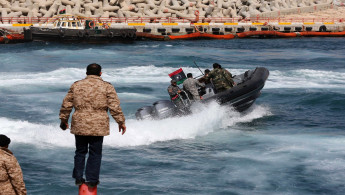Morning Glory: The ship that sank Libya's prime minister
The Morning Glory set sail from the port of Sidra in March 2014, before being intercepted by the US Navy off the coast of Cyprus, and returned to the Zawiya oil port - on the request of the former Libyan government headed by Ali Zeidan.
Al-Araby al-Jadeed investigated the tanker to discover the links between its crew, the multi-national company that had offered to sell its oil, and how the tanker incident led to the fall from power of former Prime Minister Ali Zeidan.
The siege against Libyan oil
| A company named AAEG Petroleum Limited, registered in Hong Kong, was thought to have played the role of intermediary |
Ibrahim Jadhran's militia laid siege to a number of Libyan oil ports in the east of the country, striking an enormous blow to the oil-dependent economy, and resulting in the loss of $15 billion, according to oil sector officials.
However, the militia's attempt to export 340,000 barrels of oil on the Morning Glory was the final straw that broke the camel's back.
The militia is thought to have attempted to sell the oil through two Israeli tycoons and a Senegalese business owner, who had rented a boat from Larnaca and sailed out to the oil tanker that awaited them on the edge of Cypriot waters.
However, the tanker was seized and the trio arrested - though they were later released without charge.
According to a document obtained by al-Araby al-Jadeed from Libya's National Oil Corporation, a company named AAEG Petroleum Limited, registered in Hong Kong, played the role of intermediary between the militia and European refineries to sell the crude oil.
Political fallout
After Libyan authorities were given custody of the Morning Glory and its crew, the first deputy to the head of the General National Congress, Ezzidine al-Awami, ordered the prosecutor-general to release the three members of Jadhran's militia, in addition to the 21 foreign crew members who were on board the ship.
Nouri Abusahmain, the head of the General National Congress, said that he was in Kuwait on business at the time of the incident and his deputy was responsible for the interference in the work of the prosecution.
The prosecutor-general, Abdul Kader Ridwan, who was later relieved of his duties, refused to be interviewed by al-Araby once he discovered the topic of this article.
| The Libyan oil industry has lost approximately $60 billion over the past two years due to the instability and armed conflicts |
The head of investigations at the office of the prosecutor-general in Tripoli, al-Sadiq al-Sour, did confirme that there is an arrest warrant out for the crew of the Morning Glory - who are wanted in an ongoing investigation of the case.
"The case is still open and there are requests that have been submitted to international judicial authorities to extradite people who have been involved in the illegal seizure and smuggling of Libyan oil," said Sour.
Sour also criticised the "inaction" of authorities in apprehending the Libyan militia members that were onboard the Morning Glory when it was seized.
Members of the General National Congress (GNC) were outraged at the release of the oil tanker's crewmembers and accused Ali Zeidan's government of not stopping the secessionists in the east from exporting Libyan oil.
The GNC put Zeidan under huge pressure to resign - and he was banned from travelling and placed under investigation for suspicion of corruption. When Zeidan fled the country to Germany, the country's political crisis only increased.
According to Mashallah al-Zawi, the GNC government's oil and gas minister, the Libyan oil industry has lost approximately $60 billion over the past two years due to the instability and armed conflicts that have negatively affected the oil sector, in addition to low oil prices.



